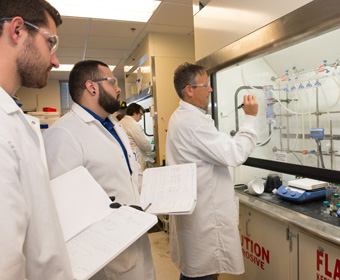
In this 2018 photo, Stanton McHardy makes a lab demonstration for student researchers at UTSA's Center for Innovative Drug Discovery. McHardy will use CPRIT funding to develop strategies and technologies to target cancer-related proteins.
AUGUST 31, 2021 — The University of Texas at San Antonio has been awarded a five-year $3.2 million grant from the Cancer Prevention and Research Institute of Texas (CPRIT). The money will go toward work at the Center for Innovative Drug Discovery (CIDD), a joint venture between the university and UT Health San Antonio, and a place where UTSA continues to make important contributions to the fight against cancer.
The CIDD will use its new CPRIT funding to develop strategies and technologies to target cancer-related proteins previously considered “undruggable.” An innovative method they will develop is the Proteolysis-Targeting Chimeras (PROTAC) platform. Stanton McHardy, UTSA associate professor of chemistry and the CIDD director, explains that part of what makes this approach effective is its ability to promote degradation of the targeted cancer protein and kill the cancer cell.
“Obviously cancer is a major medical burden to our society,” McHardy said. “Our ultimate goal is to discover the next generation of tangible, pre-clinical cancer therapeutics and advance our programs and drug candidates to a stage where they can be developed into clinical therapies to treat cancer.”
This joint venture between UTSA and UT Health has two facilities. The first, which is located at UTSA and led by McHardy, is the Medicinal Chemistry and Synthesis Core Facility. The second is the High-Throughput Screening Facility (HTSF) at UT Health, where Matt Hart is the director. Hart is also associate professor of research in the Department of Biochemistry and Structural Biology at UT Health San Antonio.
UTSA’s Doug Frantz, the Max and Minnie Tomerlin Voelcker Distinguished Professor of Chemistry, is a CIDD co-founder.
“To be selected for the CPRIT grant, we proposed a focused and resource-intensive core facility to offer CIDD collaborators and clients a one-of-a-kind capability in Texas, providing PROTAC design, synthesis and screening—an approach that is applicable to multiple types of cancers and cancer targets,” McHardy said.
The new grant is the second from CPRIT awarded to CIDD. The organization received a five-year $4.6 million grant in 2016 infusion to grow and support the center’s cancer research portfolio of small molecule drug discovery programs.
That funding enabled CIDD to establish 59 new cancer drug discovery programs. The center also executed research on triple-negative breast cancers, ovarian cancers, oral cancers, brain cancers (glioblastomas), liver cancers and childhood cancers. CIDD leaders also collaborated with Texas-based cancer researchers and institutions, securing more than $34 million in funding for collaborative cancer grants.
McHardy said the CIDD’s intent is to provide a diverse array of core facilities and expertise to facilitate the translation of basic scientific discoveries into tangible pre-clinical candidate drugs that can be further developed into clinical therapies for human disease.
In addition to making important contributions toward treating cancer, the CIDD is having an enormous impact on UTSA students by providing a distinctive research-and-learning platform where they can learn pharmaceutical-industry concepts and techniques used in drug discovery.
“Ultimately, this has provided a ‘lab to career’ transition for our UTSA students, who are being employed by leading pharmaceutical and biotechnology companies,” McHardy said.
McHardy and Frantz also credit the Max and Minnie Tomerlin Voelcker Fund for supporting CIDD's drug discovery and educational missions through substantial philanthropic gifts over the past 10 years.
“This latest award from CPRIT to the CIDD is a testimony of how we have been able to leverage these gifts to catalyze additional financial support through various state and federal funding agencies to further the return on their initial investments in our faculty and students,” Frantz said.
UTSA Today is produced by University Communications and Marketing, the official news source of The University of Texas at San Antonio. Send your feedback to news@utsa.edu. Keep up-to-date on UTSA news by visiting UTSA Today. Connect with UTSA online at Facebook, Twitter, Youtube and Instagram.
Move In To COLFA is strongly recommended for new students in COLFA. It gives you the chance to learn about the Student Success Center, campus resources and meet new friends!
Academic Classroom: Lecture Hall (MH 2.01.10,) McKinney Humanities BldgWe invite you to join us for Birds Up! Downtown, an exciting welcome back event designed to connect students with the different departments at the Downtown Campus. Students will have the opportunity to learn about some of the departments on campus, gain access to different resources, and collect some giveaways!
Bill Miller PlazaCome and celebrate this year's homecoming at the Downtown Campus with food, games, giveaways, music, and more. We look forward to seeing your Roadrunner Spirit!
Bill Miller PlazaThe University of Texas at San Antonio is dedicated to the advancement of knowledge through research and discovery, teaching and learning, community engagement and public service. As an institution of access and excellence, UTSA embraces multicultural traditions and serves as a center for intellectual and creative resources as well as a catalyst for socioeconomic development and the commercialization of intellectual property - for Texas, the nation and the world.
To be a premier public research university, providing access to educational excellence and preparing citizen leaders for the global environment.
We encourage an environment of dialogue and discovery, where integrity, excellence, respect, collaboration and innovation are fostered.